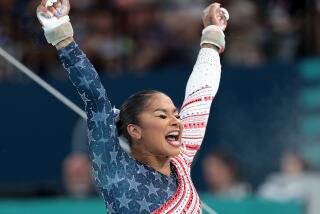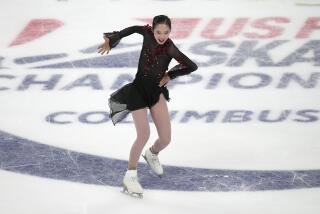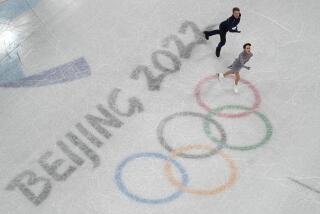Blithe Lipinski Flies to Gold in Figure Skating
NAGANO, Japan — Tara Lipinski, a tiny speck of a skater who was supposed to be too short, too young and too mechanical to outskate fellow American Michelle Kwan in the Olympic women’s figure-skating long program, wears the gold medal today because she was too oblivious to notice.
Blind, unbridled teenage adrenaline was the great equalizer Friday night at White Ring arena, where Lipinski upset Kwan in one of the most dramatic victories in the history of the sport, blissfully unaware of the pressure and the consensus of observers stacked against her.
The prevailing theory was that Lipinski couldn’t win if Kwan didn’t fall--that was the overwhelming viewpoint from here to Philadelphia, where Kwan had moved judges to tears with a long program that generated eight perfect artistic scores of 6.0 at the recent U.S. championships.
Torrance skater Kwan was the sensitive, introspective artiste on the ice; Lipinski was the pre-programmed, robotic jumping bean.
Kwan colored her performances with the delicate dabs of an Impressionist’s brush; Lipinski brought along a 64-pack of Crayolas.
Kwan was Van Gogh; Lipinski was “Go, man, go!”
According to the popular view, all Kwan had to do in Nagano was win the short program and stay on her feet for the four minutes of the long.
Kwan did both--and ended up standing on the second tier of the medals podium.
Lipinski, 15, obliterated all preconceptions about her supposedly artless and immature skating with an out-of-left-field performance that had her coach, Richard Callaghan, deliriously banging away on the rinkside railing with a rolled-up program by its conclusion.
*
When it ended, after seven triple jumps and two demanding jump combinations had been effortlessly landed, Lipinski turned into a squealing miniature speedskater, digging her toe picks into the ice and churning her legs like Eric Heiden.
“I can’t believe it! I was so good!” the Sugar Land, Texas, resident gulped in between sobs as she awaited her scores with Callaghan at her side.
It was a long wait, and a torturous one for Kwan, who had skated minutes earlier to nine artistic scores of 5.9. That should have been enough to lock up the gold medal, but technical marks of 5.7 and 5.8 left the door open by the narrowest of gaps.
At 4 feet, 11 inches, and 82 pounds, Lipinski was small enough to slip through. Her program was faster paced than Kwan’s, and Kwan had the slightest of wobbles after landing a triple flip, so Lipinski’s superior technical grades were not surprising.
Six 5.9s, three 5.8s.
Seconds later, the artistic marks:
5.8, 5.8, 5.9, 5.8, 5.8, 5.9, 5.9, 5.8, 5.9.
Lipinski squealed again and leaped to her feet, hopping up and down as if the floor of the kiss-and-cry area were a trampoline.
Up and down, up and down she went.
For the first time in all her competition here, she double-footed her landings.
“There is nothing that could be better than this night,” Lipinski said. “It feels so great, I can hardly explain it.”
At 15 years, 8 months, Lipinski is, by 60 days, the youngest individual winner of a Winter Olympics gold medal--and nearly two months younger than the previous youngest women’s figure skating champion, Sonja Henie of Norway, who won her first gold medal in 1928.
Lipinski is the sixth American to win the women’s championship, joining Tenley Albright (1956), Carol Heiss (1960), Peggy Fleming (1968), Dorothy Hamill (1976) and Kristi Yamaguchi (1992).
*
The 1-2 finish by Lipinski and Kwan is also the first for the United States since Albright and Heiss did it at Cortina, Italy, in 1956.
These gold and silver medals had been all but conceded to Lipinski and Kwan months ago, only not in that order.
Kwan gamely tried to keep a stiff upper lip throughout the medals ceremony and the interview session afterward, but tears eventually started rolling down her cheeks as she listened to Lipinski talk about the sheer joy that goes with wearing the gold medal.
“When I saw Tara’s second scores go up, I knew I didn’t win,” Kwan said. “I was a little disappointed. There were some tears.
“But I came here to do a job. I worked very hard, I skated well . . . c’est la vie, right? That’s life. Working hard is no guarantee you’re going to win the gold medal.”
Tears flowed after all three medal performances, including Lu Chen’s surprising ascension to third place.
Olympic bronze medalist in 1994 and world champion in 1995, Chen had fallen off the figure skating map the last two years, plagued by a foot injury and conflicts with the Chinese figure skating federation.
The nadir came last March at the world championships, when Chen, clearly unfit to skate but forced to by the Chinese federation, finished 25th--too low to earn an automatic Olympic berth. Chen needed to win a qualifier last fall in Vienna to get into the 28-skater field here.
“Last year, I didn’t skate very well,” Chen said. “My ranking went down to 25. So I wasn’t looking for a medal. I just wanted to prove to others I can still skate.”
With the most elegant and artistically coherent routine of the evening, Chen vaulted past 1998 European champion Marina Butyrskaya of Russia for the bronze medal. Butyrskaya ended up in fourth, just ahead of Russian rival Irina Slutskaya.
Nicole Bobek of Chicago finished 17th, following her oil spill of a short program with an even messier long program. Bobek fell twice and cleanly landed only two of eight jumps in her routine, failing to attempt a combination.
Shellshocked after her short program, Bobek sportingly joked about her rough go Friday, saying, “I fell on almost everything, but I didn’t give up and I got through it.”
She said she hoped people would “remember me for how hard I tried at these Olympics and not how I did,” and exited laughing as she made one last request of the international media.
“Write something nice, please,” she said. “And no pictures of any falls!”
Ultimately, the difference between Lipinski and Kwan in this competition could be measured by the dates on their birth certificates.
Kwan is 17, only two years older than Lipinski, but they are significant years. Kwan is currently prepping for college, aspires to attend Harvard University and has an introspective temperament that often produces fits of self-doubt.
Lipinski skates to simpler rhythms. To her, life is skating practice, followed by a skating competition, followed by a victory slumber party.
*
So while Kwan micro-managed her preparation for this competition--watching everything she ate, taking care not to mingle with carriers of cold and flu viruses--Lipinski hung out at the athletes’ village, did needlepoint in the White Ring media center, played video games and generally acted like a 15-year-old.
Asked what she did Friday afternoon as she readied for her championship performance, Lipinski proudly reported, “I cleaned my room.”
The difference showed in their skating during the long program. Kwan was tentative, seeming to skate not to lose, whereas Lipinski bounded gleefully across the ice with what-me-worry abandon.
“Michelle skated very, very well,” said her coach, Frank Carroll, “but it didn’t have that kind of freedom that it had at nationals. . . .
“Tonight, I don’t think the spark was there. She was too controlled. I think she had more a feeling not to miss anything than to go out there and fight.”
Kwan didn’t entirely disagree.
“In Philadelphia [at nationals], I was more free--it felt like I was flying,” she said. “Here I was more cautious, like I was in my own world. I didn’t let go.”
Now it’s Lipinski’s world, although Kwan wasn’t ready to sign over permanent ownership just yet.
“I’ll have one more in 2002,” Kwan said. “I’ll be 21 then. Who knows?”
* RELATED COVERAGE: N4
More to Read
Go beyond the scoreboard
Get the latest on L.A.'s teams in the daily Sports Report newsletter.
You may occasionally receive promotional content from the Los Angeles Times.






